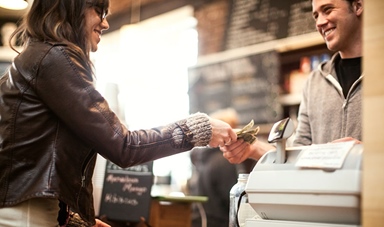Loading component...
At a glance
Australia is well on its way to becoming a cashless society, with forecasts suggesting that cash will account for just 2 per cent of transactions by 2024. This makes Australia the world’s fourth most cash-averse economy, after Sweden, Denmark and Hong Kong.
Cash payments are often associated with “under the table” transactions to avoid tax obligations, or for black market dealings involving drugs or stolen property.
It’s also literally quite dirty, and the move towards cashless transactions has accelerated during the pandemic. However, cash also has many legitimate uses.
1. Cash helps us stay within budget
Studies have shown that people spend significantly more when they use “virtual” as opposed to physical money. Overspending with cash is more difficult, because of the visual cue that we are spending hard-earned dollars.
The same goes for avoiding impulse purchases. Paying with cash helps people stay on budget and is also a guaranteed way of avoiding overdraft fees.
2. It promotes financial inclusion
Some vulnerable members of society rely on cash (and to a certain extent cheques). Its demise could leave the elderly and low-income consumers without access to goods and services.
Victims of domestic abuse often put aside emergency cash because it’s easier to conceal from the perpetrator, who may control or monitor their bank accounts.
New Zealand has created a stewardship program for cash use, with the aim of promoting financial inclusion.
3. Cash is there when technology fails
Digital payment methods rely on an uninterrupted electricity supply and internet connectivity. During extreme weather events and natural disasters such as fires, floods or earthquakes, cash remains a sure bet.
Cash is also commonly relied upon in rural and remote areas, where internet connections may be patchy and unreliable.
4. Cash protects privacy
Some people prefer the privacy of a cash transaction, as it leaves virtually no footprint. They may resent being asked for contact details when paying online, and the associated marketing that can go with it.
There are plenty of legitimate reasons why privacy may be required – for example, buying a surprise birthday gift for a partner when you have a joint credit card account.
5. Cash makes it easier to be charitable
Many homeless people rely on cash donations for their survival. While some street buskers and charities are now accepting donations electronically, most still prefer cash and would lose their incomes entirely if cash disappeared.
6. It helps teach financial literacy
Paying an allowance in cash helps children develop lifelong saving habits. While there are apps, such as Spriggy, to help young people learn how to budget their pocket money, the tangibility of cash is hard to beat as a teaching tool.
The old-fashioned piggy bank may still be the surest path towards becoming a good saver in later life.

